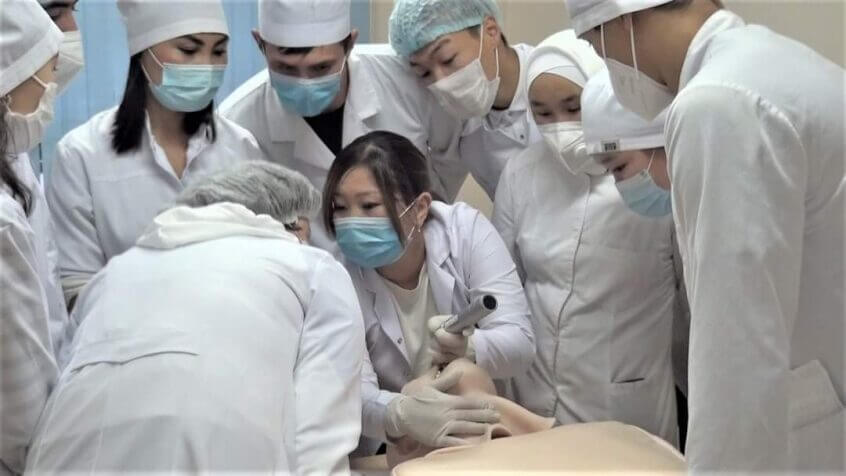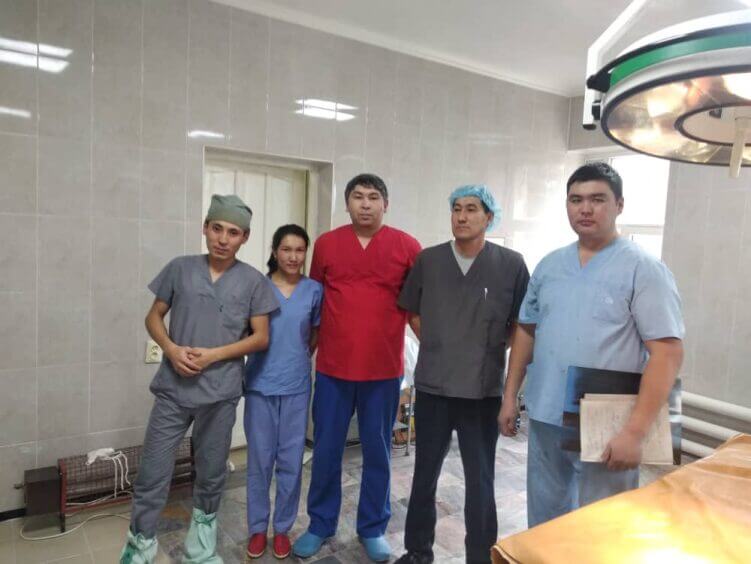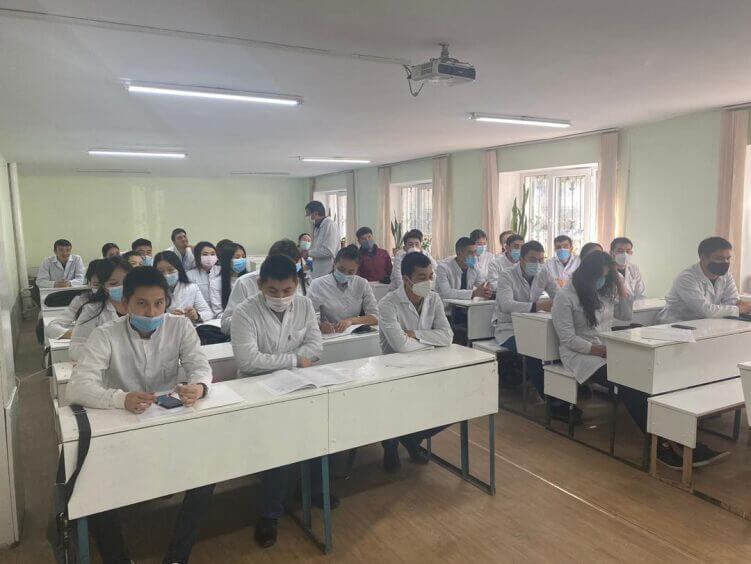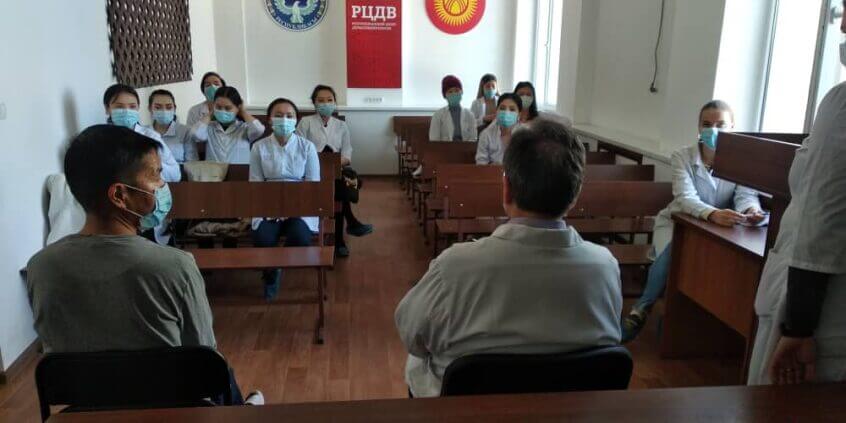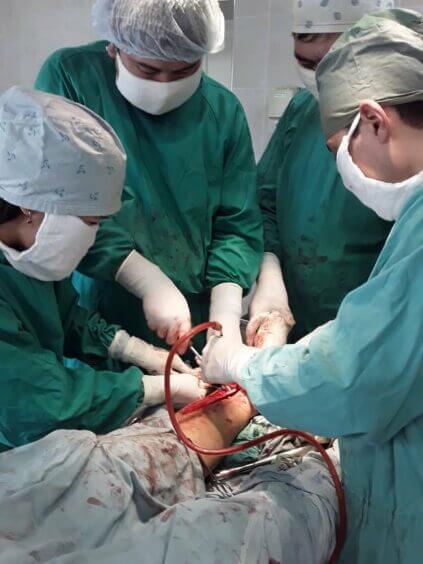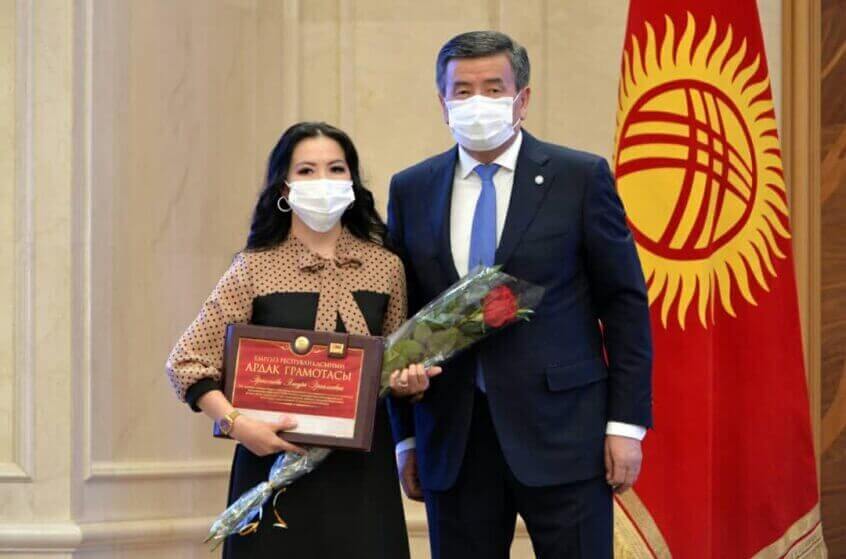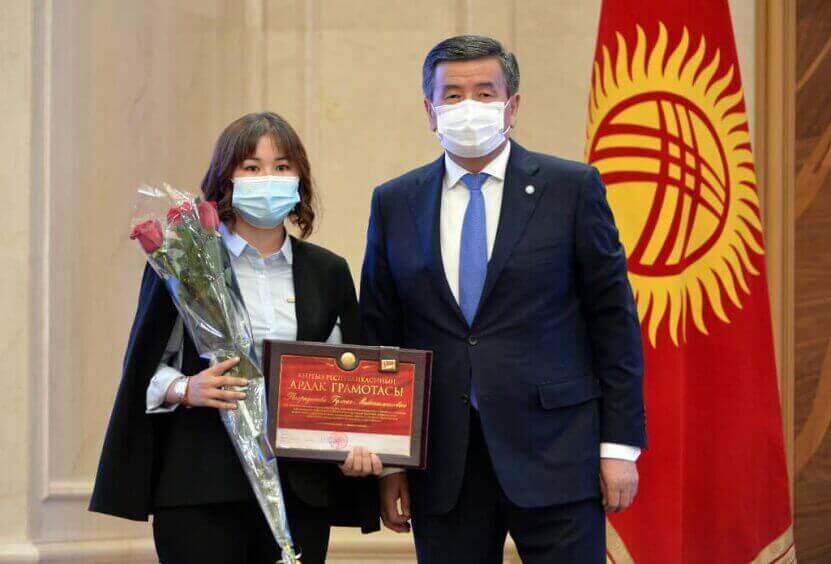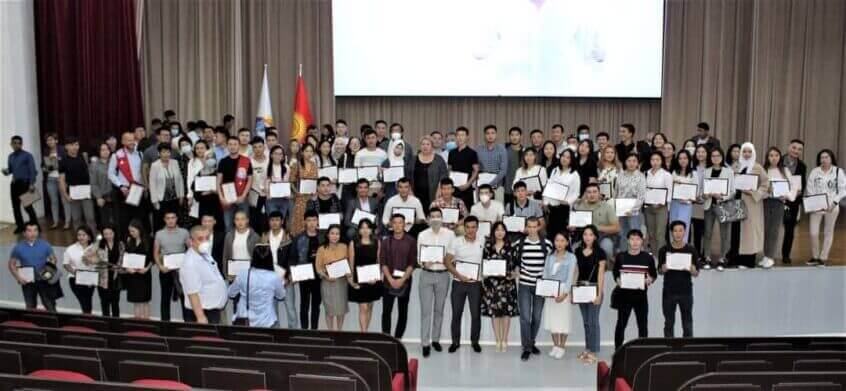
- License:
- № LS190004636
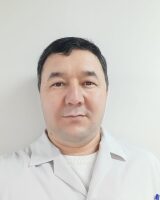
- Academic degree:
- Candidate of Medicine
- Position:
- Dean
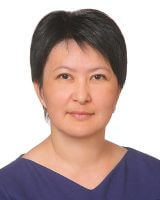
- Position:
- Vice Dean

- Position:
- Head of the paperwork sector
- aselma@mail.ru
- +996 (312) 543515
- The main campus, room 205
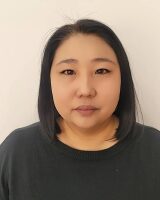
In 1999, At KSMA was established the Centre of Postgraduate Education.
In 2005, the Centre of Postgraduate Education was transformedinto the Institute of Postgraduate Medical Education (IPME), which was an independent subdivision of the KSMA named after I.K. Akhunbaeva.
In 2007, The Institute of Postgraduate Medical Education was renamed the Faculty of Postgraduate Medical Education ( FPME) at the KSMA.
The goal of the Faculty of Postgraduate Medical Education is to train qualified specialists to provide various types of medical and medico-social assistance to the population.
The main activity of the Faculty of Postgraduate Medical Education (FPME) is aimed at the implementation of postgraduate training of graduates of medical universities for independent practical activities, which are issued a state-recognized certificate, which legally confirms the right to practice medicine in the specialty
The deans of the faculty were renowned medical workers such as Doctor of Medical Science Alekseev V.P. ( from 1999 to 2004), Doctor of Medical Science , Professor Musuraliev M.S. ( from 2004 to 2009), Doctor of Medical Science, Professor Akynbekov K.U. ( from 2009 to 2012), Doctor of Medical Science, Professor Kaliev R.R. ( from 2012 to 2016), Doctor of Medical Science Salibaev O.A. ( from 2016 to 2022)
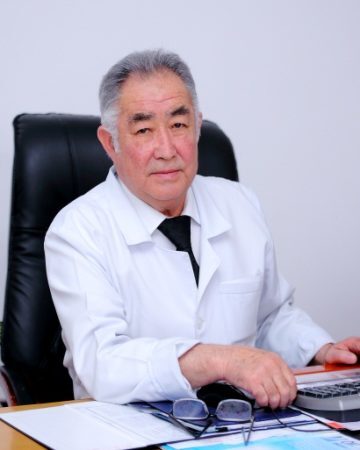
Doctor of Medical Science , Professor Musuraliev M.S. ( from 2004 to 2009)
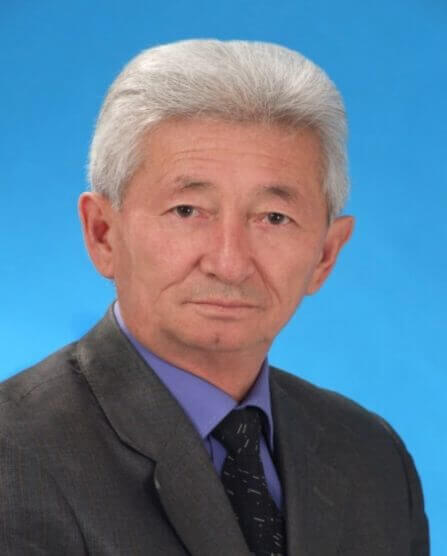
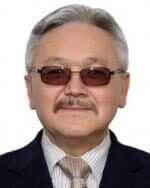
Doctor of Medical Science, Professor Kaliev R.R. ( from 2012 to 2016)
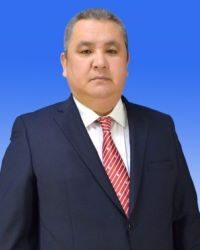
Doctor of Medical Science Salibaev O.A. (from 2016 to 2022)
Currently, the Faculty of Postgraduate Medical Education is headed by the Candidate of Medical Science Turganbaev A.E.
There are 2 sectors in the Faculty: the educational methodological sector and the office work sector, where work specialist with many years of experience. KSMA employs over 800 highly qualified teachers, academicians and corresponding members of the National Academy of Science of the Kyrgyz Republic, doctors and candidates of science, honored scientists and honored doctors of the Kyrgyz Republic. Higher and postgraduate training is carried out at 55 departments. In addition, FPME KSMA attracts specialists from research institutes, Republican medical treatment facilities, highly qualified specialists from large medical healthcare organizations.
The activities of FPME are regulated by the following regulatory legal documents:
- - By the decree of the Government of the Kyrgyz Republic of July 31, 207. No. 303 “On Medical postgraduate education”
- - By the order of the Ministry of Health of the Kyrgyz Republic No.297 dated 15.07.2007. “ On the implementation of the resolution of the Government of the Kyrgyz Republic of July 31.2007”
- - Decree of the Government of the Kyrgyz Republic of t11.12.2017 No. 798 “On amendments and additions to the Decree of the Government No. 303 of the 31.07.2007” On Medical postgraduate education”
- - License No. G2019-0006 dated October 2, 2019, the expiration date of the license is unlimited, for the right to conduct educational activities in the specialties of residency;
- - Regulations on residency
- - Model curricula and educational professional residency programs;
- - Charter of KSMA;
- - Internal and external regulatory documents related to the activities of the FPME.
- Folder
- Statement
- Copy of the passport
- A copy of the university graduation diploma (certificate from the dean's office)
- Health certificate (form 086u)
- Photo 3х4 - 2 pieces
- Personal sheet
- Autobiography
- Resident registration card.
- Приказ МЗ КР №400 от 31.05.2018г."Об утверждении формы сертификата об окончании ординатуры".
- Приказ МЗ КР №401 от 31.05.2018г."Об утверждении плана приема на 2018-2019 учебный год".
- Приказ МЗ КР № 593 от 13.08.2018г. "О внесении изменений в приказ МЗ КР №399 от 31.05.2018г." Об утверждении перечня медициинских и фармацевтических специальностей,по которым предусматривается прохождение ординатуры"
- Приказ МЗ КР № 27 от 17.01.2018г. "О реализации постановления Правительства КР от 11.12.2017г. № 798 "О внесении изменений в постановление Правительства КР "О медицинском последипломном образовании в КР от 31.07.2007г. №303"
- "Инструкция для руководителей организации здравоохранения, являющихся клиническими базами по прохождению ординатуры"
- Постановление правительства № 246 от 26.01.2011г." Об утверждении Положения об оплате труда работников здравоохранения КР"
- Приказ МЗ КР № 665 от 20.09.2018г. "Об утверждении требований(каталог компетенций) последипломного образования по специальности "Врач-эпидемиолог"
- Приказ № 248 от 18.05.2015г. "Об утверждении Стратегии развития последипломного и непрерывного медицинского образования в КР на период 2014-2020 гг.
- Приказ МЗ КР № 408 от 31.05.2018г."Об утверждении Минимальных стандартов и индикаторов оценки клинических баз,Категорий клинических баз стационарного и амбулаторного уровня, Категорий организаций здравоохранения на ПМСП для выполнения программы по специальности "Врач общей практики"
- Сведения об организациях здравоохранения республики, которые могут оплачивать заработную плату и предоставить льготное жилье ординаторам в 2018-2019 году
- Указание МЗ КР №784 от 19.09.2018г. "Об организации рабочей группы организационно-методической помощи при прохождении первого года ординатуры"
- Указание МЗ КР № 50 от 25.01.2019г."О проведении круглого стола по децентрализации"
- Приказ МЗ КР № 629 от 04.09.2018г. "Об утверждении типового учебного плана и основной образовательной программы последипломной подготовки врачей первого года обучения для узких специальностей по общеврачебной практике и форме индивидуального плана ординатора".
- О внесении изменений в постановление Правительства Кыргызской Республики "О медицинском последипломном образовании в Кыргызской Республике" от 31 июля 2007 года №303
- Приказ МЗ КР №224 от 30.02.2018г." Об утверждений государственных требований последипломного медицинского образования по специальности "Семейная медицина/ Врач общей практики"
- Приказ МЗ КР № 398 от 31.05.2018г."Об утверждении трехстороннего договора на последипломной подготовки ординатора"
- Приказ № 630 от 04.09.2018г. "Об утверждении требований и каталогов компетенций последипломного медицинского образования(специальности "Педиатрия","Терапия", "Хирургия", "Акушерство и гинекология","Эндокринология","Гастроэнтерология""Остеопатия", стоматологические специальности).
- Указание № 707 от 24.08.2018г "О заполнении вакантных мест в ординатуру (2тур) на 2018-2019 уч.год.
- Приказ МЗ КР от 04.10.2018г. № 691 "Об утверждении требований к структуре основной профессиональной образовательной программы последипломного медицинского образования в КР"
- Постановление Правительства №411 от 30.08.2018г. "О внесении изменений в постановление Правительства КР "О медицинском последипломном образовании в КР от 31.07.2007 №303".
- Приказ МЗ КР №399 от 31.05.2018 "Об утверждении перечня медицинских и фармацевтических специальностей, по которым предумастривается прохождении ординатуры"
- Приказ МЗ КР №138 от 15.03.2019 г. "Об утверждении инструкции для руководителей организации здравоохранения, являющихся клиническими базами по прохождению ординатуры"
- Приказ МЗ КР № 570 от 27.06.2017г. "О проведении обучающего тренинга «Подготовка клинических руководителей в региональных организациях здравоохранения» в рамках сотрудничества образовательных организаций и региональных организаций здравоохранения по децентрализации высшего медицинского образования в Кыргызской Республике"
- Приказ МЗ КР № 631 от 04.09.2018г. "Об утверждении перечня клинических баз для прохождения ординатуры"
- Приказ МЗ КР №433 от 14.06.2018г. "Об утверждении состава комиссии для распределения выпускников клинической ординатуры и врачей-интернов бюджетной формы обучения выпуска 2018г.
- Приказ МЗ КР № 535 от 14.06.2017г. "Об утверждении состава комиссии по распределению выпускников клинической ординатуры и врачей-интернов бюджетной формы обучения выпуска 2017г."
- Приказ МЗ КР № 407 от 31.05.2018г. "Об утверждении Положения о клинических базах медицинских образовательных организаций и Категорий организаций здравоохранения стационарного уровня для выполнения программы последипломной подготовки
- Указание №841 от 04.10.2018 г. "Об обсуждении учебного плана первого года обучения и дневника ординатора по узким специальностям"
- Указание о проведении круглого стола на тему "Децнтрализация последипломного медицинского образования в региональные клинические базы"
- Приказ МОиН КР от 20 сентября 2016 года № 1308/1 «Об утверждении Методики отслеживания трудоустройства выпускников образовательных организаций высшего профессионального образования»
- ПРИКАЗ МЗ КР № 964 от 10.10.2019г. "0б утверждении документов, регулирующих порядок трудоустройства и распределения выпускников, проведению мониторинга по их трудоустройству и ответственности в случае отказа (неявки) от отработки по месту распределения"
-
KSMA orders
- Приказ КГМА №228 от 26.11.2014г. "О прохождении клинической практики в регионах КР за 2014-2015уч.год
- Приказ КГМА № 171 от 08.10.2015г. " О прохождении клинической практики в регионах КР за 2015-2016 уч.год.
- Приказ КГМА №42 от 16.02.2016г. "О клинической практике для клинических ординаторов 2 года обучения с учетом профиля"
- Приказ КГМА №283 от 05.10.2018г. "О клинической практике для клинических ординаторов 1-2 года обучения с учетом профиля"
- Приказ КГМА №32 от 01.02.2019г. "О создании рабочей группы об организации самооценки и подготовке отчета по учебным программам для аккредитации последипломного медицинского образования КГМА"
- Приказ КГМА №385 от 14.12.2018г. "О проведении выездной полугодовой аттестации у ординаторов, проходящих клиническую практику в регионах КР"
-
Applications
- Приложение №1 к приказу №630 от 04.09.2018г. Требования последипломного медицинского образования (по специальностям ординатуры) Уровень высшего профессионального образования Специальность: Врач педиатр
- Приложение 2. Требования последипломного медицинского образования Уровень высшего профессионального образования Дисциплина «Терапия»
- Приложение 3. Требования последипломного медицинского образования Уровень высшего профессионального образования Дисциплина: «Эндокринология» Специальность: «Врач эндокринолог»
- Приложение 4. Требования последипломного медицинского образования Уровень высшего профессионального образования Дисциплина «Гастроэнтерология» Специальность: «Врач гастроэнтеролог»
- Приложение 5. Требования последипломного медицинского образования Уровень высшего профессионального образования Дисциплина «Хирургия» Специальность: «Врач хирург»
- Приложение 6. Требования последипломного медицинского образования Уровень высшего профессионального образования Дисциплина "Акушерство и гинекология" Специальность "Врач акушер - гинеколог"
- Приложение 7. Требования последипломного медицинского образования Уровень высшего профессионального образования Дисциплина «Стоматология» Специальность: «Врач - стоматолог общей практики»
- Приложение 8. Требования последипломного медицинского образования Уровень высшего профессионального образования Дисциплина «Стоматология» Специальность: «Хирургическая стоматология»
- Приложение 9. Требования последипломного медицинского образования Уровень высшего профессионального образования Дисциплина «Стоматология» Специальность: «Ортодонтия»
- Приложение 10. Требования последипломного медицинского образования Уровень высшего профессионального образования Дисциплина «Стоматология» Специальность: «Детская стоматология»
- Приложение 11. Требования последипломного медицинского образования Уровень высшего профессионального образования Специальность: «Ортопедическая стоматология»
- Приложение 12-1. Требования последипломного медицинского образования Уровень высшего профессионального образования Специальность: «Челюстно - лицевая хирургия» (2 года)
- Приложение 12-2. Требования последипломного медицинского образования Уровень высшего профессионального образования Специальность: «Челюстно - лицевая хирургия» (3 года)
- Приложение 13. Требования последипломного медицинского образования Уровень высшего профессионального образования Дисциплина «Терапевтическа стоматология»
- Приложение 14. Требования последипломного медицинского образования Уровень высшего профессионального образования Специальность «Остеопатия»
- Приложение. Требования последипломного медицинского образования Уровень высшего профессионального образования Специальность "Инфекционые болезни" (ПРОЕКТ)
-
Resolutions, decisions, minutes of meetings
1. Organization of the work of the departments of KSMA to achieve the main goal - improving the training of residents for independent practical activities.
2. Coordination of educational and methodological activities of the departments of KSMA, which train residents.
3. Organization of work on the provision of normative and methodological documentation for postgraduate education and the implementation of a quality management system for education at the postgraduate level.
4. Participation in the organization and holding of scientific and practical forums on the problems of medical education, scientific and practical medicine
5. Ensuring cooperation with external organizations on the activities of FPMO, training residents and interns.
6. Coordination of interns' clinical practice in regional medical institutions.Since July 2017, by order of the KSMA, created the Osh department of industrial practice and residency of Post Medical Education of KSMA.
- Приложение 16 к приказу № 630 от 04.09.2018г. КАТАЛОГ КОМПЕТЕНЦИЙ по специальности «Врач терапевт» ПОСЛЕДИПЛОМНЫЙ УРОВЕНЬ
- Приложение 17 к приказу № 630 от 04.09.2018г.КАТАЛОГ КОМПЕТЕНЦИЙ по специальности «Врач эндокринолог» ПОСЛЕДИПЛОМНЫЙ УРОВЕНЬ
- Приложение 18 к приказу № 630 от 04.09.2018г. КАТАЛОГ КОМПЕТЕНЦИЙ по специальности «Врач гастроэнтеролог» ПОСЛЕДИПЛОМНЫЙ УРОВЕНЬ
- Приложение 19 к приказу № 630 от 04.09.2018г. КАТАЛОГ КОМПЕТЕНЦИЙ по специальности «Врач гастроэнтеролог» ПОСЛЕДИПЛОМНЫЙ УРОВЕНЬ
- Приложение 21 к приказу № 630 от 04.09.2018г. КАТАЛОГ КОМПЕТЕНЦИЙ по специальности «Врач стоматолог общей практики» ПОСЛЕДИПЛОМНЫЙ УРОВЕНЬ
- Приложение 22 к приказу № 630 от 04.09.2018г.КАТАЛОГ КОМПЕТЕНЦИЙ по специальности «Врач стоматолог хирург» ПОСЛЕДИПЛОМНЫЙ УРОВЕНЬ
- Приложение 23 к приказу № 630 от 04.09.2018г.КАТАЛОГ КОМПЕТЕНЦИЙ по специальности «Врач ортодонт» ПОСЛЕДИПЛОМНЫЙ УРОВЕНЬ
- Приложение 24 к приказу № 630 от 04.09.2018г.КАТАЛОГ КОМПЕТЕНЦИЙ по специальности «Врач стоматолог детский» ПОСЛЕДИПЛОМНЫЙ УРОВЕНЬ
- Приложение 25 к приказу № 630 от 04.09.2018г.КАТАЛОГ КОМПЕТЕНЦИЙ по специальности «Врач стоматолог ортопед» ПОСЛЕДИПЛОМНЫЙ УРОВЕНЬ
- Приложение 26 к приказу № 630 от 04.09.2018г. КАТАЛОГ КОМПЕТЕНЦИЙ по специальности «Врач челюстно-лицевой хирург» ПОСЛЕДИПЛОМНЫЙ УРОВЕНЬ
- Приложение 27 к приказу № 630 от 04.09.2018г. КАТАЛОГ КОМПЕТЕНЦИЙ по специальности «Врач стоматолог терапевт» ПОСЛЕДИПЛОМНЫЙ УРОВЕНЬ
- Приложение 28 к приказу № 630 от 04.09.2018г. КАТАЛОГ КОМПЕТЕНЦИЙ по специальности «Остеопатия» ПОСЛЕДИПЛОМНЫЙ УРОВЕНЬ
- Приложение. КАТАЛОГ КОМПЕТЕНЦИЙ по специальности "Инфекционные болезни" ПОСЛЕДИПЛОМНЫЙ УРОВЕНЬ (ПРОЕКТ)
